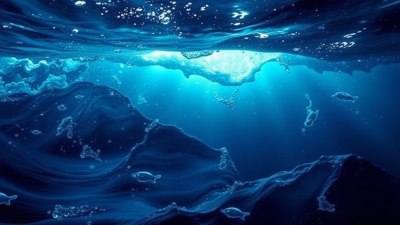The Ocean Knew Before You Did
Explore the mysteries and knowledge of the ocean in this insightful article.

Image created with Flux Schnell
The ocean, a vast and enigmatic expanse, holds secrets that often elude human understanding. For millennia, it has captivated our imaginations and continues to do so. This article delves into the depths of ocean knowledge, revealing how it anticipates changes in climate, life forms, and much more.
Understanding Oceanic Wisdom
The ocean is often seen as a distant entity, yet it plays a pivotal role in our planet's health and has a unique way of communicating its conditions. Scientists believe that the ocean has an innate ability to respond to environmental changes before they manifest on land. By studying ocean currents, temperatures, and salinity, researchers can forecast weather patterns and potential natural disasters such as hurricanes and tsunamis.
The Role of Ocean Currents
Ocean currents are like the bloodstream of the planet, circulating warm and cold water across different regions. These currents affect global climate and weather. For instance, the Gulf Stream, a warm ocean current, influences the climate of North America and Western Europe. Changes in these currents can signal shifts in climate patterns. Understanding these shifts allows us to predict potential drastic weather events.
Climate Change Indicators
The ocean acts as a barometer for climate change, absorbing CO2 and heat from the atmosphere. As a result, the ocean's temperature is rising, leading to coral bleaching and affecting marine biodiversity. These changes often occur well before their effects are felt on land. Scientists analyze ocean temperatures to provide early warnings of climate-related events, underscoring the ocean's role as an indicator of the planet's health.
Marine Life and Ecosystem Changes
Marine ecosystems are incredibly diverse and sensitive to changes in their environment. The ocean's ability to predict shifts in ecosystems is vital for biodiversity conservation. For example, certain fish species migrate to warmer waters as temperatures rise, which can result in overfishing in some areas while others suffer from a lack of resources. Understanding these patterns helps in managing fisheries and protecting vulnerable species effectively.
Ocean Acidification
As the ocean absorbs more CO2, it becomes more acidic. This phenomenon threatens marine life, particularly organisms with calcium carbonate shells, like mollusks and coral. The health of these species directly impacts the food chain and local economies dependent on fishing. Monitoring acidification levels provides insights into potential declines in fish populations and informs conservation efforts.
Indigenous Knowledge and Ocean Awareness
Indigenous communities have long understood the ocean’s rhythms and changes, often incorporating this knowledge into their cultures and practices. Their practices of sustainable fishing and respect for marine life offer valuable lessons in marine conservation. By blending modern science with traditional ecological knowledge, we can build more effective strategies for protecting ocean health.
Technology and Ocean Exploration
Advancements in technology have revolutionized ocean exploration. From submersibles to underwater drones, scientists can now study previously unreachable areas of the ocean. These tools help gather data on underwater ecosystems and phenomena, enhancing our understanding of how ocean health is linked to global ecological changes.
The Importance of Marine Protected Areas
Marine Protected Areas (MPAs) are crucial for preserving biodiversity and assisting the ocean in its role as an environmental buffer. These areas help mitigate the effects of climate change and human impact on marine environments. Protecting large sections of the ocean ensures that ecosystems can thrive, enhancing their natural ability to respond to changes efficiently.
Public Awareness and Ocean Advocacy
Public engagement is essential for ocean conservation efforts. Educating communities about ocean health fosters advocacy and effective stewardship. Programs that encourage citizen participation in research and clean-up initiatives empower individuals and help build a collective sense of responsibility for the ocean.
The Future of Ocean Health
The future of our oceans hinges on our ability to heed the signs they provide. With the growing threat of climate change and pollution, it is imperative that we act swiftly to protect these vital ecosystems. By advocating for sustainable practices and supporting policies designed to reduce carbon emissions, we can ensure that the oceans continue to thrive and serve as our planet's protector.
The ocean knew before you did, continuously providing clues about the state of our environment. It signals changes that affect not only marine life but also societies worldwide. By understanding and respecting the ocean, we can cultivate a healthier planet. The knowledge it holds is not merely academic; it is a vital resource that can guide us toward sustainable living and conservation efforts.











